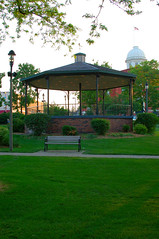Help me think about the "Public Square." I have a lot of this stuff in my head and I want to get it out there and see where I'm wrong, right and what to do about it.
A public square, or particularly a "town square", is a place, historically an intersection of important crossroads for trading of goods as well as the sharing of ideas.
I live in a town square city. If you visit my city, Woodstock, IL, that's the place to visit. It's quaint, beautiful, historic, and well organized. If you showed up on a random day you might find a farmers market nearly all the way around the square, or a wedding or band concert in the gazebo, or a group of youth hanging around on a bench, or a fair that brings in people from some distance to visit and shop, or a family having a picnic in the shade, or a Groundhog Day celebration at dawn, or a car show, and on and on it goes. And that's just the center park area. Around the outside are permanent stores, the Opera House, an art gallery, restaurants and more.
After 6+ years here there's one thing I haven't found in our public square: The Gospel.
A lot has changed both with goods & ideas. The public square of goods is now mostly at Wal-Mart (a drive away, but everything you need is there, not just specialty items at the farmers market). The public square of ideas is TV or the Internet where the talking heads (of whatever sort) give their side of the story, or deliver their breaking news, and so on.
Even local stuff is discussed more and more on Facebook than through actual interaction with friends and neighbors. We've learned about local concerns, missing/runaway kids, meetings, etc often on Facebook first. Our local newspaper tries to create this a bit by having comments under each article, but the anonymity of it creates a culture of sniping rather than thinking or caring or doing something in response.
There are some great stories of how Christians have used the public square in the past. Biblically, guys like Paul go into the marketplace where he can interact with all sorts of folks. That leads some of the local philosophers to bring him to the Areopagus (Mars Hill) for a more intellectual presentation as someone with a new idea. We tend to think of the Areopagus as the public square, but it isn't. It's more of a private, formal forum for certain intellectuals. The public square was the marketplace, the less formal place, the everyone-passes-through-here place.
Back in seminary I remember reading and hearing stories of missionaries to the American frontier and circuit rider preachers and evangelists. I was so taken I wrote a paper on open-air preaching. I'm sure you've heard grand stories of the public preaching and impact of men like George Whitefield and John Wesley. The public square and open-air was a crucial space for these men and their ministries. It wasn't always a place of acceptance, as tomato stains would testify. Those are some great stories too.
Now some, surely, will be concerned over a re-imagining of using the public square because of how a few have used it. Some of you are not eager to be associated with Kirk Cameron or the mimes who trap themselves in a box only to show that Jesus is the way out. I hear you. But I can't help but to think that someday we will look back at TODAY as a come-and-see, affluent, hidden time in American Christian history. That we will wonder why we didn't take the good news and release it through public heralding sooner. That we will study how this was the time when our public preaching was through advertising and marketing and little more.
I'm not sure the answers, but I think the questions are important. I think there's something we're leaving to the "crusades" and quacks that we aren't supposed to leave to them. I think that our disdain for what goes for "public preaching" nowadays isn't enough to keep us from figuring out how to do it better, how do it right.
What do you think?
UPDATE: Read my follow-up post: "The Kids Downtown."




